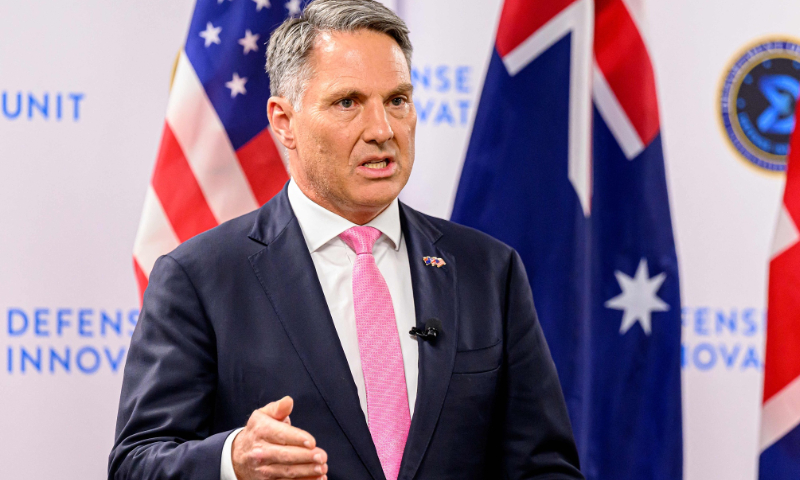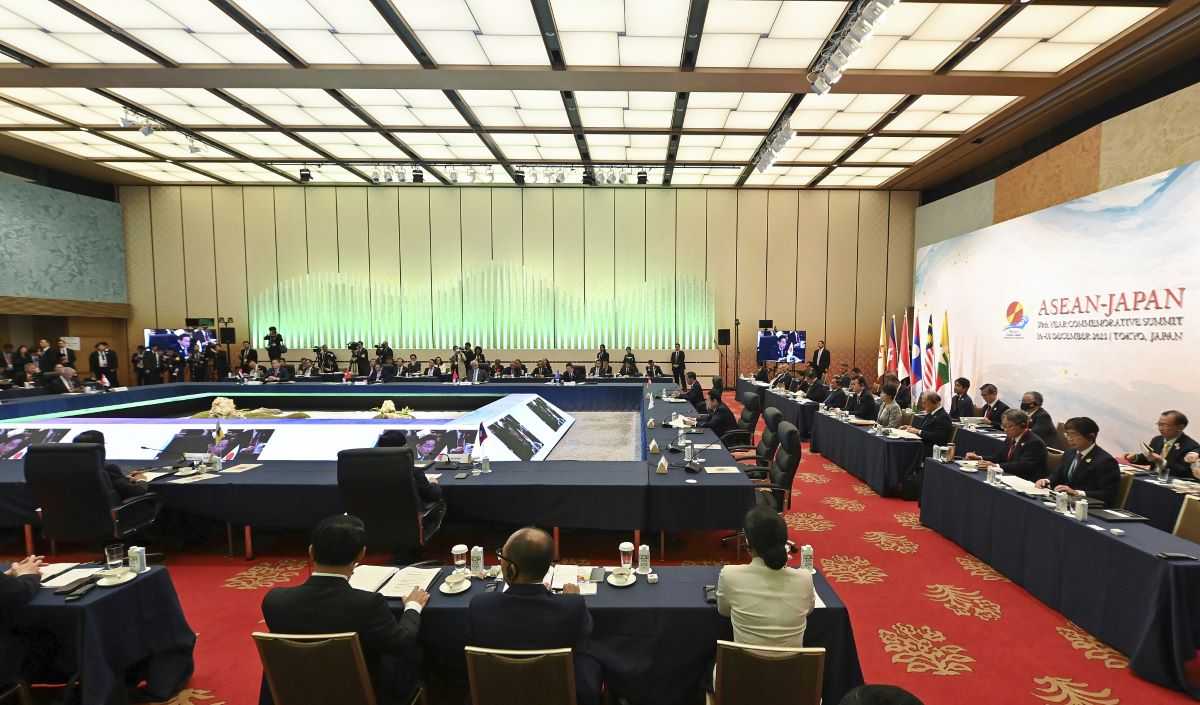Hypes of 'Japan's potential participation in AUKUS' merely feeble rehash for political gains of Canberra and Tokyo: experts

Australian Defense Minister Richard Marles speaks during a joint press conference with the US Defense Secretary and the British Defense Secretary during the AUKUS Defense Ministerial Meeting in Mountain View, California, on December 1, 2023. Photo: VCG
Politicians and media from Australia and Japan are launching another wave of hype over Japan's possible "participation in AUKUS", after Australian Deputy Prime Minister and Defense Minister Richard Marles said in a recent interview that Australia is keen to see Japan collaborate with the AUKUS security partnership, which also involves the US and UK, on defense technology development in the future.
But Chinese experts believe the collaboration between the US-led security clique and Japan is not realistic at this time of strong uncertainty. They pointed out that Japanese Prime Minister Fumio Kishida is trying to make some achievements as his cabinet approval rating continues to hit a record low, as is Marles given that many critics have dubbed him Australia's "worst defense minister of all time."
According to Japanese media outlet Kyodo News on Sunday, Marles said Australia wants to "work more closely with Japan" on technological developments, acknowledging that the Asian nation is a "place of innovation" and is "at the cutting edge of technology," while ruling out Tokyo's participation in the centerpiece project for AUKUS to deliver nuclear-powered submarines to Canberra.
"I think it is natural that we would be talking about a greater level of cooperation between the three countries - US, UK and Australia - and Japan, in terms of joint collaborations going forward," he said in the interview with Kyodo News in the Australian capital.
With Australia holding a general election next year, the Albanese administration is facing criticism from opposition parties. Marles has also been criticized as the "worst defense minister of all time" as some critics claimed that he has made few achievements during his tenure. This is why he hopes to expand AUKUS to make a breakthrough, Chen Hong, director of the Australian Studies Center at East China Normal University, told the Global Times on Monday.
AUKUS was launched in 2021 as the US and its allies beefed up their security cooperation targeting China in the Indo-Pacific.
Kyodo reported that the first pillar of AUKUS focuses on nuclear submarine acquisition, while the second pillar is aimed at developing a range of advanced capabilities in areas such as artificial intelligence and hypersonic missiles.
The report noted that AUKUS has been open to engaging with allies and partners on pillar two, but Marles indicated that collaboration with Japan would not happen anytime soon.
Chen noted that progress in the first pillar has been very slow and many uncertainties remain. Many domestic voices question the US for developing such a security partnership as the country's actual production capacity is currently limited, due to its deep involvement in two major conflicts, assisting Ukraine and Israel. Under this situation, it will be somewhat difficult for the US to incorporate Australian submarines into its military production schedule, Chen said.
Therefore, Australia is trying to promote and further activate the second pillar as it hopes to obtain some cutting-edge technology through the collaboration, the expert believes.
However, Chen pointed out that Japan and Australia have rekindled this old topic mainly due to internal political factors rather than actual needs.
Japanese media outlets revealed that support for the Kishida cabinet has been continuously low, which is why he is apparently eager to achieve a breakthrough in diplomacy and national defense to make political achievements, Chen said.
Mainichi Shimbun reported on Monday that support for the Kishida cabinet plunged to a record low of 14 percent in the latest nationwide opinion poll conducted by the media outlet on February 17 and 18.
In addition, Japan has been trying to break through the restrictions of its pacifist constitution since the Abe administration, so it also hopes to increase its presence and discourse power on the international stage through participating in AUKUS, according to Chinese observers.
But AUKUS faces a big uncertain factor - the US election. There is anxiety around the AUKUS agreement if Donald Trump is re-elected as president in 2024, according to multiple Australian media outlets.
"If support from the US decreases, AUKUS will be in name only," Chen said.
Observers also added that although the US and its allies want to contain China's peaceful development, none of them are willing to sacrifice their own interests too much in being the vanguard against it, but will rather provoke their allies and try to push them to the forefront against China.
"AUKUS seems to be a powerful alliance, but in reality, there are hidden struggles and calculations among its members," Chen said.

